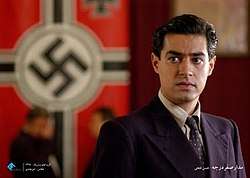Zero Degree Turn
Zero Degree Turn or Zero Degree Latitude[1] (Persian: مدار صفر درجه Madâr-e sefr darajeh) is a 2007 television series, made through the cooperation of Iran, Hungary, France, and Lebanon. The program was one of the most expensive and elaborate ever produced by Iran and attracted a large audience there.[2] It is inspired by a real-life story about Iranian diplomat Abdol Hossein Sardari, who saved Jews in 1940s Paris during the Nazi Occupation by giving out Iranian passports and allowing them refuge in the Iranian Embassy.[3] Although it has been noted that neither character names nor the story are close to Sardari's story.[4]
| Zero Degree Turn مدار صفر درجه | |
|---|---|
 Shahab Hosseini in Madare sefr darajeh | |
| Created by | Hassan Fathi |
| Starring | Shahab Hosseini Nathalie Matti Mostafa Abdollahi Iraj Rad Laya Zanganeh Roya Teymourian Masoud Rayegan Pierre Dagher Ateneh Faghih Nasiri Payam Dehkordi Rahim Noroozi Farrokh Nemati Esmail Shangaleh Fadi Edward Hasmiq Taschgian Ahmad Saatchian Ali Ghorban Zadeh Kiumars Malekmotei Gyula Mesterházy Álmos Szalay |
| Music by | Alireza Ghorbani |
| Ending theme | When I Fell in Love (Vaghti Ke Man Ashegh Shodam) |
| Country of origin | |
| Original language(s) | Persian French German |
| No. of episodes | 30 |
| Production | |
| Executive producer(s) | Hassan Beshkoufeh |
| Cinematography | Morteza Poursamadi |
| Running time | Each episode approximately 50 minutes |
| Release | |
| Original network | Channel 1 (Iran) |
| Original release | April 23, 2007 – November, 2007 |
| External links | |
| Website | |
Plot
Set in the time of the Second World War, Madare Sefr Darajeh follows the life of an Iranian student named Habib Parsa (Shahab Hosseini) who travels to Paris to study. There Habib meets a French Jewish woman named Sara Astrok, a student at the same university. At first antagonistic toward one another, Habib and Sarah eventually fall in love. They run into many problems, including persecution by the Nazis and by Sarah's Zionist uncle, but are united in the end.[2]
Cast
- Shahab Hosseini - Habib Parsa
- Nathalie Matti - Sara Astrok
- Roya Taymourian - Asieh
- Masoud Rayegan - Mohammadhoseyn Parsa
- Pierre Dagher - Behruz fattahi
Opinions
The government financed film has been widely cited as an effort by the government to demonstrate its positions in regards to the difference between Jews and Zionists, encompassing sympathy for the Jewish people (including an orthodox view of the Holocaust) while remaining hostile to Zionism.[5]
The director of the series, Hassan Fathi, said about it, "I decided to produce this series in 2002, and in those days the Holocaust was not an issue. Even if one single Jew is killed in German camps, the world should be ashamed. By the same token, if a single Palestinian dies, the world should be ashamed. I sympathize with the Jewish victims of World War II, to the same extent with women and children victims of the war in Palestine."[2]
The TV series won the praise and support of Iran's Jewish Association, an independent body that safeguards the community's culture and heritage. The association has criticized Mr. Ahmadinejad's comments about the Holocaust but has praised Mr. Fatthi's show.[5]
DVD release
The series was retitled Zero Point Orbit for its 2007 release by Bita Film, Tarzana, California. The Persian title is unchanged. The DVDs include neither English nor Persian subtitles.
English dub
The series has an English dub that was recorded in Hong Kong by Red Angel Media.[6]
References
- IRIB Media Trade
- In hit Iranian TV drama, Holocaust no 'myth'
- Stephen Spector Professor of English Stony Brook University Evangelicals and Israel : The Story of American Christian Zionism 2008 page 100 "In the fall of 2007, they were glued to their television sets every Monday night to watch the wildly popular "Zero Degree Turn," which recounted the story of an Iranian-Palestinian Muslim who saved a French Jewish woman and her family ..."
- In the Lion's Shadow: The Iranian Schindler and his Homeland in the Second World War
- Fassihi, Farnaz (September 7, 2007). "Iran's Unlikely TV Hit". The Wall Street Journal: B1. Retrieved September 17, 2007.
- "Red Angel Media". Archived from the original on 2016-02-05. Retrieved 2016-01-17.
External links
| Wikiquote has quotations related to: Zero Degree Turn |
- Official site
- Iran Holocaust drama is a big hit – BBC News – Friday, 30 November 2007
- "Iran launches Holocaust miniseries". Jerusalem Post. Archived from the original on 2012-03-13. Retrieved 2007-09-30.
- "Iran retells the story of Nazis and Israel on state television – Haaretz – Israel News". Retrieved 2007-09-30.
- "'Zero Degree Turn': An Iranian soap opera – Israel Culture, Ynetnews". Retrieved 2007-09-30.
- "Editor's Notes: Global amnesia". Jerusalem Post. Archived from the original on 2012-03-13. Retrieved 2007-09-30.
- "'Just World News' with Helena Cobban: An Iranian Schindler's List: "Zero Degree Turn"". Archived from the original on October 13, 2007. Retrieved 2007-09-30.